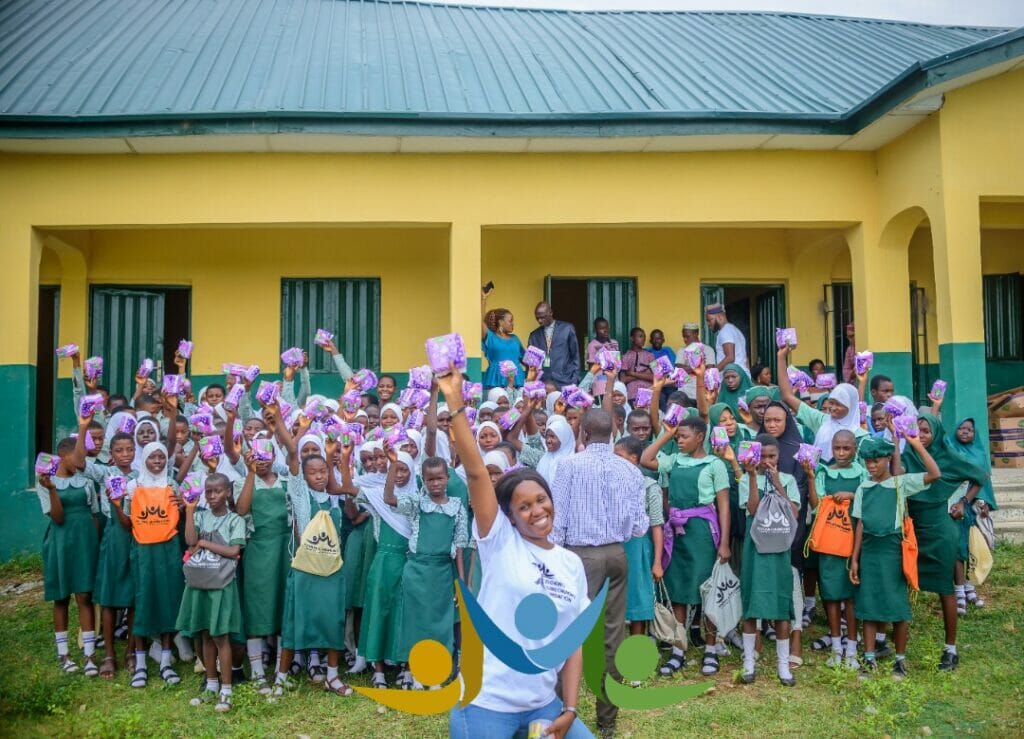Eziokwu Ebubechukwu Foundation (EEF), a Non-Governmental Organisation, on Saturday distributed sanitary pads to no fewer than 300 school girls while appealing to the Federal Government (FG) to support tax waiver on sanitary pads.
The foundation also had an outreach for the students, tagged, ‘Book Drive Her Care’ to improve the livelihood of students in the rural areas.
The Founder of the NGO, Mr. Ezeukoh Ebubechukwu, while distributing the sanitary pads alongside other educational materials to the students, said it was aimed at impacting society.
Within Nigeria got a report from NAN that the sanitary pads were distributed to female secondary students in Alawo, Egbedi, and Iragberi Grammer Schools respectively in Osun State.
Ebubechukwu also called on the FG to support tax waivers on sanitary pads.
“This is to also fulfill the mandate that girls and women have the right to be safe, educated, and healthy.
“This project became imperative, aimed at ending period poverty and promoting shared prosperity of health rights toward improved girl-child education at the grass-root levels,” he said.
He empathised with the girls, some of whom may not be able to afford the sanitary pads on their own and may have to miss coming to school throughout their menstruation periods.
Ebubechukwu explained that government’s policy was needed to promote girl-child menstrual hygiene and keep them in school.
“In rural areas, girls do not have access to sanitary products. It is safe to say that majority of the girls in rural areas in the country cannot afford safe and hygienic-sanitary pads for proper menstrual hygiene management.
“One of the major issues with period hygiene is that sanitary pads are not only expensive; especially with the current economic state of the country, but also cannot be reused.
“It is important that tax be removed from products such as this, and more local methods normalised with product prices being regulated.
“It will also be of great help if the government gave fee sanitary pads to teenage girls in secondary schools,” he said.
He added that period products were necessities and should, therefore, be exempted from taxation.
“The removal of tax will serve a great step towards ending period poverty because it reduces the price of pads.
“The campaign as a grassroots initiative is aimed at ending period poverty. We do this through raising awareness, advocacy, and lobbying policymakers to create policies that create equal access to period products,” he said.
Ebubechukwu also called for the sensitisation of adolescent girl-child on menstrual health management to prevent environmental hazards associated with indiscriminate disposition of used sanitary pads.
He called on relevant authorities to include girl-child education and training in their responsibilities to reduce the risk factor associated with poor menstrual hygiene while in school.
He reiterated the foundation’s commitment to offering continuous support toward the eradication of poverty in most rural communities in the state.
The Project Coordinator of the NGO, Mobolaji Olaore, said that the initiative would further ensure the encouragement of the girl-child in school.
“The issue of menstrual hygiene is considered sensitive, which shouldn’t be so. This is only due to the lack of education within rural communities.
“This made us go into such communities to educate female students on the need to be aware of the effects of bad hygiene as well as discard the stigma during menstruation.
“The government needs to understand that menstrual hygiene is something that needs to be given the right attention.
“We have food schemes in various states where students are given meals during school times; the same can be done for menstrual hygiene,” he said.
He added that the girl child shouldn’t have to suffer for something that comes naturally.
The Principal of Iragberi Grammer School, Mr. Ayodeji Olugbenga, expressed profound gratitude to the foundation for extending such benevolence to their students.
